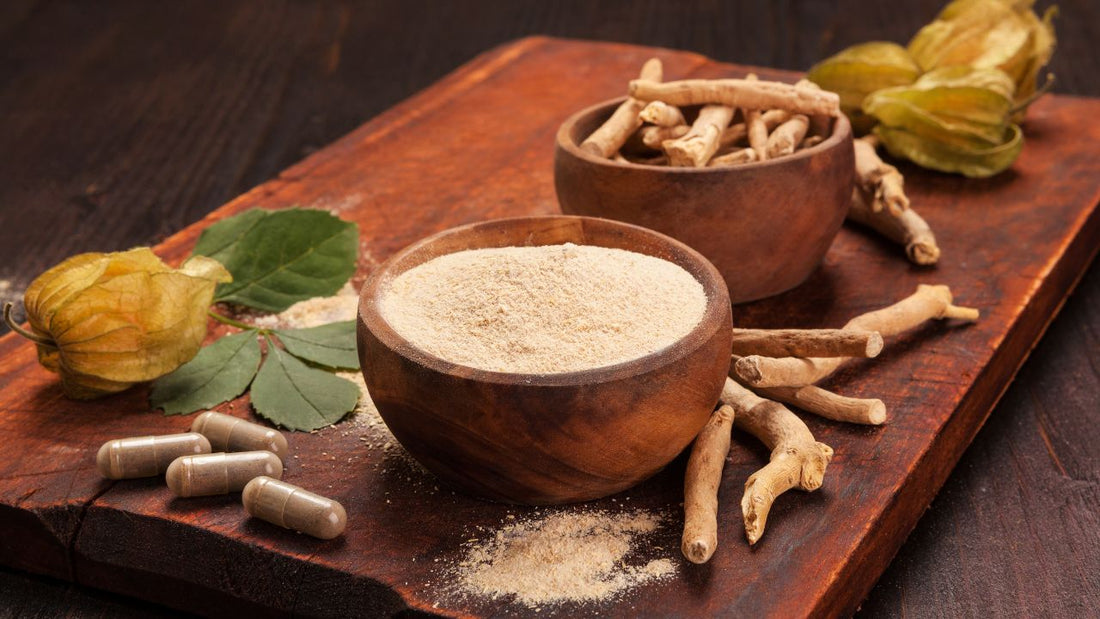
How Long Does It Take for Ashwagandha to Work?
Share
Ashwagandha, also known as Indian ginseng, is an ancient herb used in Ayurvedic medicine for centuries.
It’s classified as an adaptogen, meaning it helps the body adapt to stress. Modern research shows it has numerous benefits, including:
- Reducing stress and anxiety
- Improving sleep quality
- Boosting energy levels
- Supporting immune health
It has also been shown to balance cortisol levels and support overall mental health. While the benefits are well-documented, one of the most common questions is how soon you can expect to notice a difference after starting to take Ashwagandha.
While ashwagandha works gradually, consistent use can lead to noticeable improvements in well-being. In this article, we’ll explore how long it typically takes to see results and what factors may influence this timeline.
How Long Does It Take for Ashwagandha to Work?
The time it takes for ashwagandha to work varies depending on several factors, including dosage, individual body chemistry, and the specific condition being treated. Most people begin to notice effects between 2-6 weeks of consistent daily use.
Stress and Anxiety
One of the most widely recognised benefits of Ashwagandha is its ability to reduce stress and anxiety. Research suggests that you may start to experience relief within 4 to 6 weeks of regular use.
A study conducted in 2012 showed that participants who took 600mg of Ashwagandha daily saw a significant reduction in stress levels after just 60 days. However, some participants began noticing improvements much sooner, sometimes within a few days.
Sleep Improvement
If you’re taking Ashwagandha to improve your sleep, you might notice better sleep quality within a similar timeframe. Studies show that it can take anywhere from 1 to 6 weeks for noticeable improvements in sleep patterns.
If you're struggling with insomnia or difficulty falling asleep, Ashwagandha may help you fall asleep faster and enjoy deeper, more restful sleep over time.
Energy and Physical Performance
For those using Ashwagandha to enhance physical performance, increase energy levels, or build muscle mass, the effects may take a little longer. Most studies show that improvements in strength and endurance start to show after around 8 to 12 weeks.
In one study, participants saw significant improvements in strength and muscle size after 12 weeks of consistent use, combined with strength training.
Factors That Can Influence How Quickly Ashwagandha Works

While these are general guidelines, the time it takes for Ashwagandha to work can vary based on several factors:
1. Dosage
The amount of Ashwagandha you take can impact how quickly you feel its effects. Most studies use doses between 300mg to 600mg per day, which seems to be the most effective range for most people.
2. Consistency
For Ashwagandha to work optimally, it’s important to take it consistently. Missing doses or taking it sporadically may delay results. Make sure you’re taking it daily as recommended.
3. Form of Ashwagandha
Ashwagandha is available in different forms, including capsules, powders, and liquid extracts. Some people report faster results with liquid extracts, while others prefer capsules for convenience.
4. Individual Body Chemistry
Everyone’s body reacts differently to supplements. Factors like metabolism, diet, and overall health can influence how quickly Ashwagandha begins to work.
Does Ashwagandha Work Instantly?
No, ashwagandha doesn’t provide immediate relief. It’s not like synthetic medications that offer quick fixes. Instead, it works by gradually restoring balance and reducing stress over time. The slow onset may be frustrating for some, but it ensures long-term, sustainable benefits.
How Do You Know Ashwagandha Is Working?
To determine if ashwagandha is working, monitor changes in your stress levels, mood, energy, and sleep quality. Signs that it's effective include feeling calmer in stressful situations, waking up more rested, and experiencing improved concentration. It’s important to track your progress over weeks since the effects build gradually.
How Much Ashwagandha Should I Take?
The recommended daily dosage of ashwagandha depends on your goals:
- For general health and stress relief: 300-600 mg of a high-quality extract per day is common.
- For athletic performance: Studies suggest doses of 500-600 mg, particularly in combination with strength training.
- For sleep improvement: Start with 300 mg in the evening.
It’s always best to start with a lower dose and gradually increase as your body adjusts. Consult your healthcare provider for personalized advice.
Frequently Asked Questions
1. Can I take Ashwagandha every day?
Yes, Ashwagandha is generally safe to take daily. Most studies on its benefits involve daily use for 60-90 days. However, it’s always best to consult your healthcare provider before starting any new supplement, especially if you have underlying health conditions.
2. Is Ashwagandha safe for long-term use?
Studies suggest that Ashwagandha is safe for long-term use, but it’s important to follow recommended dosages. If you plan on taking it for extended periods, check in with your healthcare provider regularly to ensure it’s working well for your body.
3. Can I feel immediate effects from Ashwagandha?
While some people may notice reduced anxiety or stress after just a few days of taking Ashwagandha, most benefits develop gradually over several weeks. Patience and consistency are key.
4. Does Ashwagandha have any side effects?
Ashwagandha is generally well-tolerated, but some people may experience mild side effects such as digestive upset, nausea, or drowsiness. These effects are usually temporary and go away once your body adjusts to the supplement.
5. What’s the best time of day to take Ashwagandha?
You can take Ashwagandha at any time of day, but most people prefer to take it in the morning for energy-boosting benefits or in the evening to support relaxation and sleep. If you’re taking it to reduce stress, splitting the dose between morning and evening can be beneficial.
